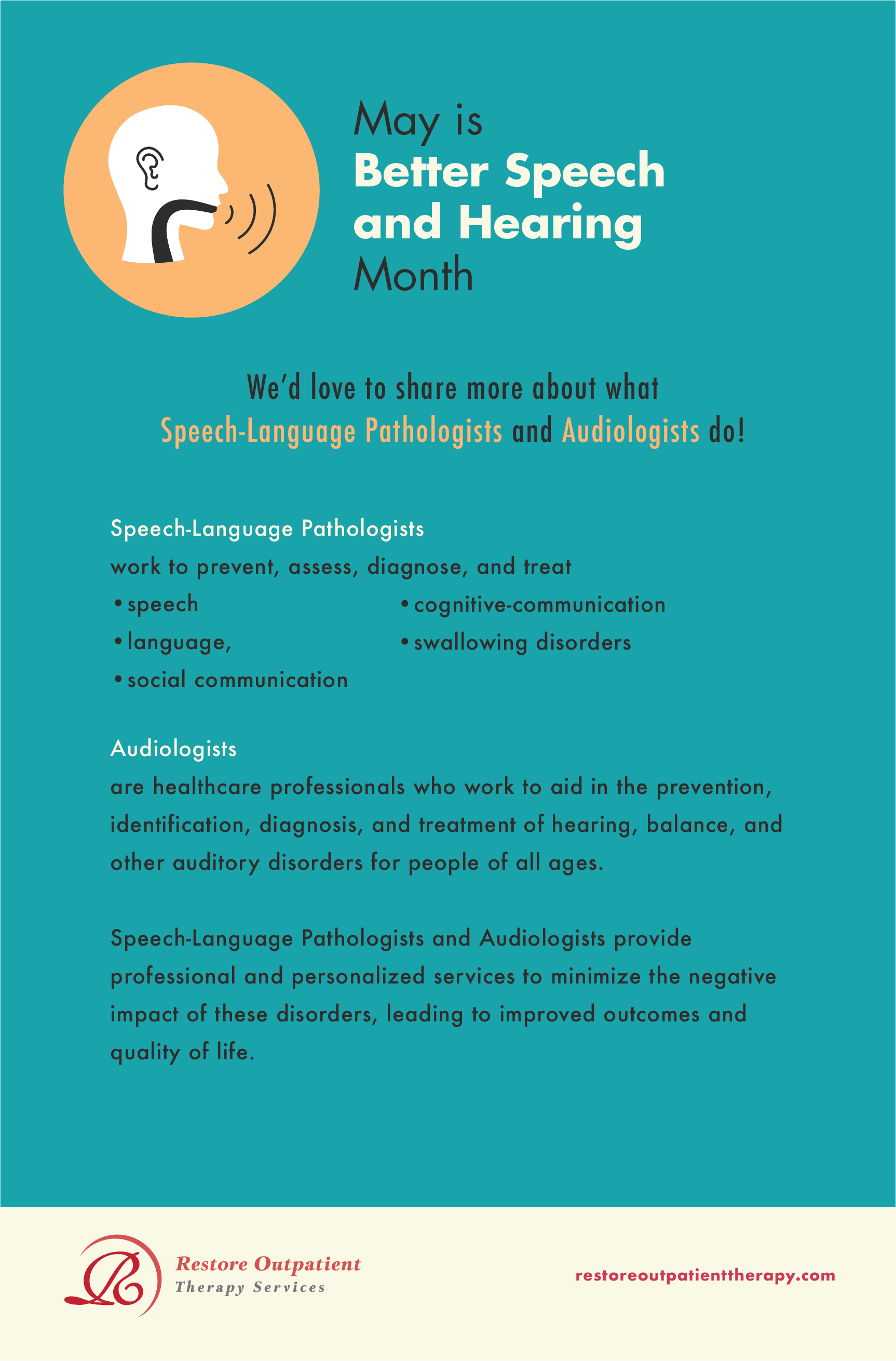May is Better Speech and Hearing Month!
Each May, Better Hearing and Speech Month (BHSM) provides an opportunity to raise awareness about communication disorders. In Aging Adults, a variety of medical conditions or injuries can lead to speech and language disorders. For someone who has never had such troubles, losing the ability to communicate effectively can be disorienting, frustrating, and upsetting. Hearing loss can affect every area of a person’s life, including physical health, mental health, career success, social life, personal relationships, and overall quality of life.
Speech and Language Pathologists and Audiologists provide professional and personalized services to minimize the negative impact of speech and language disorders. At Restore Outpatient, we treat Voice Disorders and Hearing Loss — common disorders among Aging Adults.

At Restore Outpatient, our Speech and Language Pathologists treat Voice Disorder. A voice disorder is an abnormal change in the way a person’s voice sounds. A voice disorder occurs when voice quality, pitch, and/or loudness differ or are inappropriate for an individual’s age, gender, cultural background, or geographic location. Voice issues become a problem when the attention is given to abnormal change in voice rather than to what the speaker is saying. It is also a problem if the speaker experiences pain, fatigue, or discomfort when speaking or singing.
How do you know if you have a voice disorder?
- Has my voice become hoarse or raspy?
- Does my talking require more effort than usual?
- Does my throat often feel sore, achy, or strained?
- Do I find myself repeatedly clearing my throat?
- Do I experience:
- Breathiness
- Pitch changes
- Voice “cracks”
- Loss of vocal range
- Voice loss
- Tremor
What conditions can cause voice disorder?
There are many conditions that can lead to voice disorders:
- Upper respiratory infections
- Inflammation or swelling of the vocal cords (e.g. laryngitis)
- Trauma to the vocal cords (e.g. intubation)
- Acid reflux
- Vocal abuse/misuse (e.g. yelling)
- Benign growths (e.g. vocal nodules)
- Neuromuscular conditions (e.g. Parkinson’s disease, stroke)
- Laryngeal cancer
- Habitual coughing or throat clearing
Types of Speech and Language Disorders in Adults:
- Aphasia: This involves problems speaking, understanding, reading, writing, telling time, and/or using numbers. Often misunderstood, aphasia does not affect a person’s intelligence. The most common cause of aphasia is stroke.
- Cognitive-communication disorders: Problems with thinking and communication can affect each other. Some examples are difficulty paying attention, remembering, organizing thoughts, and solving problems.
- Apraxia of speech: Speech difficulties arise from problems planning motor movements. It is caused by damage to the parts of the brain that are involved
in speaking. - Dysarthria: Speech difficulties (e.g., slurred speech) due to weakness of muscles involved in breathing and/or speaking.
- Voice Disorders: Changes in pitch, loudness, and vocal quality that negatively impact communication. These may result from nodules on the vocal cord, overuse/misuse of voice (e.g., yelling), diseases such as Parkinson’s or multiple sclerosis, and other causes.
At Restore Outpatient, our Audiologists and Speech Language Pathologists treat Hearing Loss.
Do I have hearing loss?
- Asking people to repeat what they say
- Having trouble following a conversation
- Thinking others are mumbling
- Frequently turning up the volume on the TV or radio
- Having difficulty on the phone
- Oversleeping because you didn’t hear your alarm clock
- Having difficulty hearing or understanding speech at the movies or other activities
- Avoiding noisy places such as parties, restaurants, etc.
- Noticing ringing, roaring, or buzzing in one or both ears
Causes of hearing loss?
- Presbycusis (decreased blood flow to inner ear)
- Excessive exposure to loud noise
- Genetic predisposition
- Head Trauma (accidents/falls)
- Infectious diseases
- Ototoxic medications
- Vascular diseases: Cerebrovascular arteriosclerosis, Hypertension
- Metabolic diseases: Renal diseases, Diabetes Mellitus, Hypothyroidism
- Impacted ear wax/ear infections
Although hearing loss can have serious consequences on its own, research has shown that it is also associated with the following:
-
Dementia: Adults with mild, moderate, and severe hearing loss were 2, 3, and 5 times more susceptible, respectively, to dementia, according to Johns Hopkins research.
-
Diabetes: People with diabetes were twice as likely to have hearing loss as people without the disease, a study in the Annals of Internal Medicine showed.
-
Falls. People with mild hearing loss, > 25 dB, were nearly 3 times more likely to have a history of falling, according to Johns Hopkins research. Every additional 10 decibels of hearing loss increased the chances of falling by 140%.
-
Mortality: A study in JAMA Otolaryngology–Head & Neck Surgery found that among U.S. adults aged 70 and up, those with hearing loss were 21%–39% more likely to die over the next several years than those without hearing loss. Although researchers note that the findings are not evidence that hearing loss causes earlierdeath, it demonstrates the need to take hearing loss seriously.
-
Social Isolation and Depression: Researchers from the National Institute onDeafness and Other Communication Disorders have found a strong associationbetween hearing loss and depression among U.S. adults of all ages.
If you’re looking for a new job home or are interested in becoming a Speech Language Pathologist or Audiologist, Restore Outpatient has open positions across Alabama and Florida! Our recruiters are available to assist you in placing you in the perfect position and location to fit your needs.
May is Better Speech and Hearing Month and Restore Outpatient’s focus on Wellness facilitates a better quality of life for its clients. If you have any questions about hearing loss, contact us!
For more information about BSHM, visit the American Speech-Language- Hearing Association.

Recent Comments